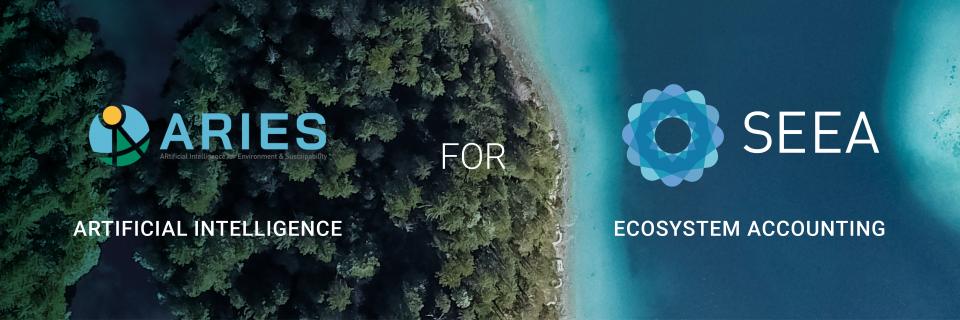Launch of the ARIES for SEEA Explorer

On 29 April, over 400 participants joined the launch of the ARIES for SEEA Explorer, a pioneering AI-powered application for natural capital accounting. Developed under the EU-funded NCAVES project through collaboration between UNSD, UNEP and the Basque Centre for Climate Change (BC3), the tool enables rapid compilation of ecosystem accounts according to the SEEA Ecosystem Accounting.
The ARIES for SEEA Explorer, which is hosted on the UN Global Platform, allows countries to create ecosystem accounts (extent, condition and select services in physical and monetary terms) in a matter of minutes, rather than months. The release of the Explorer is extremely timely, as noted by UNSD Director, Stefan Schweinfest, who opened the session by citing the tool’s role in the implementation of the recently adopted SEEA Ecosystem Accounting (EA). By automating the compilation of accounts, the Explorer gives countries a leg up in compiling the SEEA EA. In addition, as noted in remarks by Statistics South Africa, the Explorer exemplifies the importance of the UN Global Platform in providing a collaborative cloud-based environment for innovative methods and data sharing.
The tool, which was launched as a Beta version, automates accounts production through the use of global datasets, models and artificial intelligence (AI). While many tools for ecosystem accounting make use of global datasets, the Explorer is the first and only one to use AI, through the Artificial Intelligence for Environment and Sustainability (ARIES) technology. As demonstrated by Professor Ferdinando Villa of the Basque Centre for Climate Change, users can specify compilation for any region (such as a country, watershed or administrative region), and the application uses machine reasoning to select the “best available” models and data sources to generate the accounts, which can be further improved by users through using national datasets or national parameters. Although the “best available” models and data sources are automatically used, the process is not opaque. Instead, a report detailing the models and data sources used for each query.
The launch also included a lively question and answer session, with many participants eager to know about the Explorer’s potential and future plans. Currently users can compile accounts for land cover; ecosystem extent; ecosystem condition (forests); physical ecosystem services (crop provisioning, pollination, global climate regulation and sediment regulation); and monetary ecosystem services (crop provisioning, pollination, and global climate regulation). More services, such as nature-based tourism and water regulation will be added in the future. New functionalities will be developed to enable users to add their own datasets through a simple drag-and-drop function of the interface. This will allow users to incorporate local/national data into the Explorer and improve the quality of their results. Users will also be able to decide who accesses their additional datasets: they can keep their dataset confidential or give access to selected users or make it broadly available for further reuse.
Bert Kroese, Chair of the UN Committee of Experts on Environmental-Economic Accounting and Deputy Director General of Statistics Netherlands, provided closing remarks and stressed the role of the Explorer in making data and models more interoperable. In particular, the ARIES model for interoperability contributes towards ambitious yet achievable goals for wider data and model interoperability in the SEEA community. To this end, UNSD is leading the development of an interoperability strategy which will describe the roles and responsibilities of all stakeholders (data providers, research and model developers, and platform hosts) to support global SEEA Ecosystem Accounting implementation.
Find more about the ARIES for SEEA Explorer, including how to register and use the application, on its homepage: https://seea.un.org/content/aries-for-seea
Related news story published by DESA https://www.un.org/en/desa/artificial-intelligence-saving-natural-world
Future updates to the Explorer will be announced on the homepage, as well as in the SEEA News & Notes.
